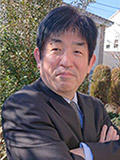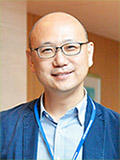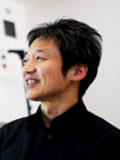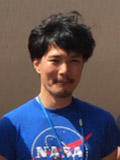Alumni Stories

"Contributing to solving corporate problems and creating new businesses as an innovation coordinator"

- (Inaugural Class)
- Dr. Masumi Asakawa
- Innovation Coordinator,
Research Promotion Division of Materials and Chemistry,
Department of Materials and Chemistry,
National Institute of Advanced Industrial Science and Technology (AIST)
As a deputy director of the Interdisciplinary Research Center for Catalytic Chemistry of AIST, Dr. Masumi Asakawa has been taking the lead in obtaining research funding for NEDO and other large projects, collaborating with national universities, and organizing the research environment. Dr. Asakawa has also contributed to generating value from research findings through discussions about research results.
Dr. Asakawa currently works as an innovation coordinator at the institute and contributes to finding solutions for firms and creating new businesses by matching corporate needs to the institute's potentials. Further, he endeavors to organize an environment where private funding can be utilized for research purposes and researchers can identify social challenges and address them in their own R&D projects.
Reference
"A research manager driving the JST's ERATO Project simultaneously with the researchers"

- (Inaugural Class)
- Dr. Shinichiro Fujii
- Research Manager,
ERATO Nakamura Macroscopic Quantum Machines Project,
Research Center for Advanced Science and Technology, University of Tokyo
Dr. Shinichiro Fujii is a research manager of the JST's ERATO Nakamura Macroscopic Quantum Machines Project.
The Nakamura project aims to advance quantum information processing technologies backed by the principles of quantum mechanics, and actualize "quantum machines." As a project headquarters member, Dr. Fujii manages research progress and supports the entire research team, which consists of 2 groups of approximately 60 members.
Dr. Fujii also participates in the MEXT's Quantum Leap Flagship Program (Q-LEAP) as a headquarters member in the field of quantum information processing technology. He contributes to driving research and to the development of researchers in the area of quantum computers and quantum simulators.
Reference
"Establishing a start-up to create new businesses for small factories in Tokyo"

- (Inaugural Class)
- Mr. Taku Furukawa
- Founder & Business Producer, TOKYO FABHUB
Mr. Taku Furukawa engages in a variety of activities aiming to vitalize the manufacturing industry of small factories in Tokyo and create new businesses both at home and abroad.
Mr. Furukawa recognizes the global disruptions in the business environment as a great opportunity for small-size enterprises to flourish. He established TOKYO FABHUB and created a network of over 100 small factories of a wide variety in Katsushika and Adachi wards, which have a high level of technical capabilities. Through TOKYO FABHUB, he also works on creating new products and new services.
Furthermore, Mr. Furukawa undertakes unique human resources development activities, in which he connects overseas entrepreneurs with small Japanese factories, and organizes workshops and tours at the small factories for overseas MBA students.
Reference
"Promoting ‘Hatenathon' activities to pose questions to social issues"

- (Second Graduating Class)
- Mr. Kenichi Sato
- Professor and Associate Dean, Faculty of Life Sciences, Kyoto Sangyo University
Representative Director, Hatenathon Co-creation Lab
Mr. Kenichi Sato coined a new word, "Hatenathon" ("Hatena [a question mark in Japanese]"+"Marathon"), a concept of question-driven learning and beyond, as one of the approaches to solve social issues. Using "Hatenathon," a learner verbalizes and shares latent challenges underlying the issues.
Mr. Sato has been conducting "Hatenathon" activities at regional and civil communities and high school and college students, as well as at places for R&D and talent and organizational development training, prompting the participants to raise questions. He has also introduced the method to teachers who help disseminate "Hatenathon" as a facilitator. More than 5,000 people have participated so far.
"Hatenathon" is a unique concept and it delivers methods or opportunities that cast questions from society to science, and from science to society—its further expansion is highly anticipated.
Reference
"Using connection skills to involve relevant parties and successfully conducting an experiment on a rainfall forecast app with about 24,000 participants"

- (Second Graduating Class)
- Ms. Hiroko Nakajima
- Coordinator,
Headquarters of Innovation Co-Creation & Research Center for Enhancing Metropolitan Resilience,
National Research Institute for Earth Science and Disaster Resilience
While promoting collaborative partnership in disaster mitigation studies and engaging in IP-related operations, Ms. Hiroko Nakajima participated in the PM training and worked on a demonstrative experiment to mitigate damages of localized heavy rain*.
Ms. Nakajima fully utilized her communication skills and established cooperative relationships with university researchers and firms, creating a team to advance the research. She implemented the design with the team, proposed during the project, for an existing rainfall forecast app and conducted a social experiment to examine evacuation behavior from localized heavy rain. Approximately 24,000 people participated in the experiment, allowing the collection of valuable data. Ms. Nakajima will continue her endeavors with researchers even after the completion of the course.
*Note: Research project title on the second stage of PM training:Information Design Using Brain for Delivering A Warning Localized Heavy Rain.
Reference
"Leading a space research team as a research leader and a PM"

- (Third Graduating Class)
- Dr. Kiwamu Izumi
- International Top Young Fellow,
Department of Space Astronomy and Astrophysics,
Institute of Space and Astronautical Science, Japan Aerospace Exploration Agency
Dr. Kiwamu Izumi is participating in the world's first full-scale space gravitational-wave mission (LISA, scheduled for launch in 2034), led by the European Space Agency. He is leading a research group of 20 people and is a PM of the LISA working group established within the JAXA Advisory Committee for Space Science.
Dr. Izumi is managing a team of researchers developing instruments installed on LISA and studying theories on the sources of gravitational waves. He aims to make a significant scientific contribution to LISA, a project driven by international cooperation, as one of the Japanese participants.
As a first step, Dr. Izumi is now advancing R&D with a goal to transfer to the JAXA's international cooperation project by 2022.
LISA consists of three spacecrafts flying 2.5 million kilometers apart in a triangular formation. It measures extremely small fluctuations in the laser light exchanged between the spacecrafts to detect gravitational waves arriving from deep space. The observation of the gravitational waves is expected to lead to the advancement of research on supermassive black holes.
